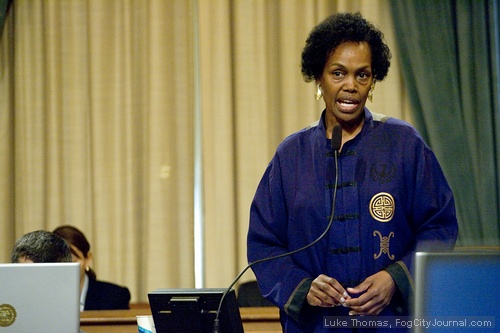
Supervisor Sophie Maxwell is backing a plan to move San Francisco
towards public power generation by replacing the aging and polluting Mirant power plant
with four City-owned natural gas-burning power plants.
Photo by Luke Thomas
By Ari Burack
June 17, 2008
San Francisco supervisors will consider a proposal today urging the city to come up with a new solution for closing the controversial Mirant power plant — a solution that would have the city rely solely on outside energy transmission sources.
The resolution, co-sponsored by seven of the city’s 11 supervisors, would call on the city to present a “transmission-only solution” to closing the plant, an aging, heavily polluting facility located in the city’s southeastern Potrero district.
The California Independent System Operator, the regulatory agency that oversees the state’s electrical grid, has said the Mirant Corp.-owned plant’s 150 megawatts of electricity generation must be somehow replaced in order to turn the plant off and maintain the reliability of the grid.
Already being considered are two dueling proposals to close the facility.
One, supported by some supervisors including Supervisor Sophie Maxwell, whose district includes the neighborhoods most affected by the pollution, calls for building four new, natural gas-burning power plants. The new combustion turbines would be owned by the city. Supporters argue that approach would give the city control over the turbines’ eventual shutdown and replacement with alternative energies.
A second proposal, endorsed by Mayor Gavin Newsom, would close Mirant’s most heavily polluting unit and retrofit three of the plant’s current smaller, diesel units to burn natural gas.
The retrofitted plants would remain privately owned.
Which of the two proposals would be cleaner remains in dispute, but Newsom contends the retrofits would be much cheaper than the estimated $270 million combustion turbine project.
The Board of Supervisors will revisit the combustion turbine proposal at its July 15 meeting, while Newsom has pledged to submit new legislation on his offering in the coming weeks.
Either proposal would be in addition to the planned introduction in 2010 of the Trans-Bay Cable, which would supply an estimated 400 megawatts of electricity to the city from Pittsburg.
According to Cal-ISO spokesman Gregg Fishman, though the cable is expected to provide more electricity than the Mirant plant currently generates, multiple sources of energy are needed for grid reliability, should the cable transmission ever be disrupted or in need of maintenance.
Tuesday’s resolution, co-sponsored by supervisors Maxwell, Aaron Peskin, Bevan Dufty, Jake McGoldrick, Chris Daly, Gerardo Sandoval and Ross Mirkarimi, asks the city to come up with a third possibility to run by Cal-ISO: no power plants at all.
It calls on the city’s Public Utilities Commission and the city attorney to develop a proposal that relies only on energy transmission into the city, and not new in-city generation, as a replacement to the Mirant plant.
The resolution also calls for the establishment of minimum standards — addressing emissions, energy costs to residents, compatibility with future deployment of renewable resources, and increased city control — for any in-city power generation project, should that be adopted.


 The Hunger Site
The Hunger Site
June 22, 2008 at 9:17 am
Natural gas sits on top of petroleum, as, for example, in Iraq, Nigeria, Angola, and Algeria, and on top of coal, as on the Northern Cheyenne Reservation in Montana. It is therefore, like petroleum, cause for violent conflict and massacre of the innocent all over the world.
On the aboriginal Australian Burrup Peninsula, plant burning diesel, just like the Mirant plan, turns natural gas pumped in the Indian Ocean into liquified natural gas (LNG) for shipping to hugely dangerous and fossil fuel intensive LNG plants between Tijuana and Ensenada, after which it is piped to California.
So, Sophie Maxwell is suggesting that we export our pollution to poor aboriginal (Black) tribal Australians.